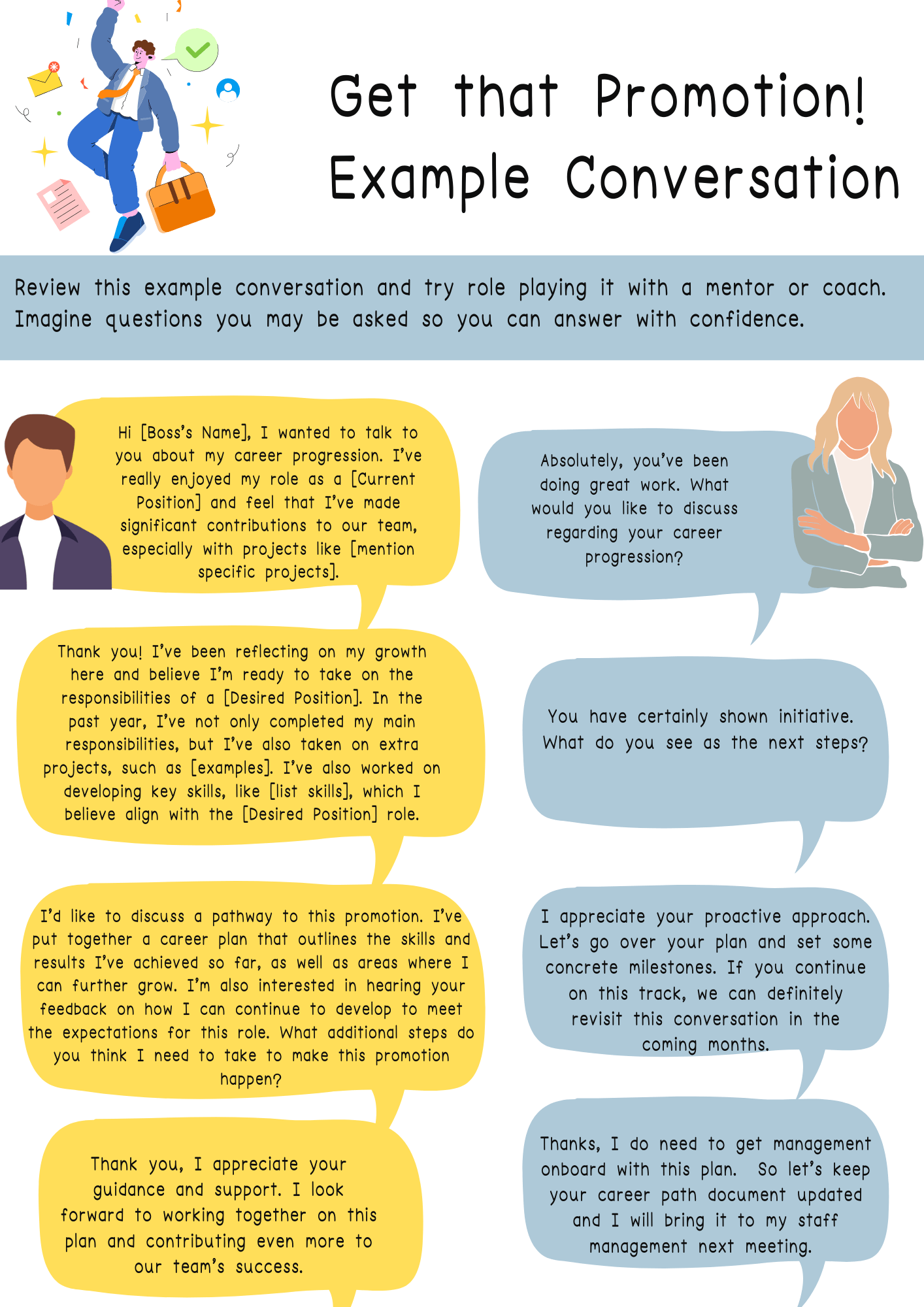How to Ask for a Promotion or Raise: Make YOUR OWN Step-by-Step Career Plan
If you're eyeing that next big step in your career you need more than just a wish list—you need a solid plan. Walking into your boss's office without preparation can leave you unfulfilled and underappreciated. Here's a structured guide to help you advance to a promotion and raise, backed by research and actionable advice. This plan empowers you to take control of your career, ensuring your boss knows your career ambitions and the value you bring to the table.
“Employees who ask for promotions and raises are 70% more likely to get them.”
Career Plan in 5 Steps
Do your Research
Create a discussion document
Make Career Progression Chart
Prepare for the Conversation
Follow up with your Boss
“Preparing a list of accomplishments can increase the likelihood of a successful raise discussion by 40%.”
Why You Need a Career Plan: The Power of Being Proactive
Did you know that 80% of promotions are given to employees who show initiative and take ownership of their career growth? It's not enough to be great at what you do; you have to be strategic about where you want to go. Having a well-defined career plan helps you and your manager align your professional goals with business objectives.
Employees need to be their advocates. Why? Businesses have cycles. In some years, employee salary and talent management are a focus; in other years, they are not. Your manager may be thinking of their own job more than the employees who work for them. In both cases, the employees who take action to know the company policies on raises and promotions and do what they can to build their skills and prove their value are more likely to succeed at work and in their careers.
Make your Step-by-Step Career Plan
Step 1: Research Your Position and Industry Standards
Before starting the conversation about promotions or raises, knowing your worth is crucial. Websites like Glassdoor, Payscale, and industry reports are great resources for understanding the market rate for your role. This knowledge gives you the confidence to discuss your value and potential with your boss, setting the stage for a successful negotiation. Read this first if you want more information on this step.
Action Point
Compile your career document outlining your accomplishments, skills, certifications, and market research. This document will be the backbone of your promotion and salary negotiation.
Step 2: Create a Career Discussion Document
Creating a detailed plan like the one shown in the document below is a smart first step. This plan provides a clear roadmap for your career discussions, breaking them down into smaller, digestible meetings with your manager. It's a structured approach that reassures both you and your boss that your career progression is on track.
Key to success is treating your career like a job. I know that may sound funny, but many people put 100% of their effort into doing great work, but zero effort into their career growth. Following this plan helps you to clarify where are are now, what you want in the future and the steps to get there. But more importantly, it keeps you and your boss focused on actionable steps and objective requirements to get your raise or promotion.
Action Point
Create your Career Discussion Document using the format shown. Track your goal and how each discussion creates an action plan to reach your goals. Use my example document to ensure you are transparent about the requirements needed to meet your goals. Your manager needs to give you honest input and feedback on performance objectives and skill development. So make this guide the start of an open discussion.
Step 3: Develop a Career Progression Plan
Your career progression plan should outline your roles, accomplishments, and skills acquired over the years. For instance, if you've progressed from a Business Analyst to a Senior Project Manager, highlight specific achievements, such as:
- A Summary of your Career Status and Objective
- Budget levels or similar responsibilities
- Leadership or team management skills
- Specific Business Outcomes (ie, project delivery or cost reductions)
Action Point
Create a summary of your roles based on the above key points. Emphasize how each role has prepared you for the next role. You want to illustrate that your career progression plan has been intential and based on merit. Keep the information simple and visual to demonstrate your readiness for a promotion and raise.
Step 4: Know What to Say to Your Boss
How you approach your boss with your request can make all the difference. Your boss may be your manager, but they may be focused on other things. So you need to set the scene for the career plan discussion. Avoid coming accross as demanding, but instead see it as a moment for coaching and planning with your boss. Show your leadership skills by being ready for the conversation and acting on feedback given.
A good way to prepare yourself is to role play. If you have access to an internal mentor, ask them to help you. An internal mentor, is not your manager, but is someone who knows the business and can help you prepare. Ask your internal mentor to challenge you and give reactions similar to what your manager would do. See the example conversations below to help you with the role playing.
Action Point
Schedule a Dedicated Meeting Avoid mentioning a raise or promotion in passing. Set up a dedicated time to discuss your career path.
Start with Your Accomplishments Begin the conversation by highlighting your achievements and your impact on the company.
Discuss Your Career Goals Share the documents you've created, including your career discussion notes and progression plan, to show you're serious about your growth.
Ask Open-Ended Questions can open up a constructive discussion. Show that you expect and want their feedback and are willing to do the work to be ready for promotion.
Express Appreciation that your manager has taken the time to give you feedback, explain the company's promotion timing and process, and suggested additional steps for you to take.
Open-Ended Questions for Discussion
"What skills or competencies do you think I should develop to prepare for the next step in my career?"
This question shows that you are eager to learn and grow. It helps identify the specific skills or behaviors you need to focus on to advance to the next level.
"What projects or responsibilities can I take on to demonstrate that I’m ready for a promotion?"
Asking this helps you understand which areas to target for growth and gives you an opportunity to prove your capability by taking on new challenges aligned with the company's goals.
"How do you see my contributions impacting the team and the company's success?"
This question invites feedback on your performance and gives you insight into how your work is perceived, providing a chance to align your efforts more closely with the organization's objectives.
"Can we set specific milestones or objectives that I need to achieve to move forward in my career?"
This establishes a clear roadmap for your career development. Setting measurable milestones makes it easier to track progress and revisit the discussion at future meetings.
"What advice do you have for someone in my position who wants to advance to [desired role] within this company?"
This question opens up a conversation about your career aspirations and shows that you're thinking long-term. It also allows your manager to share insights or experiences that could guide your growth within the organization.
Step 5: How to Ask for a Raise
Sometimes you may not be ready for a promotion, but feel you should get a rasie. Statistics show that employees who prepare their case effectively are 40% more likely to receive a raise. However, be prepared for the possibility of a counteroffer. If your boss suggests a different figure, take the time to consider it.
When asking for a raise, your focus should be on the value you bring to the company, not on your personal financial needs.
Action Point
Prepare your conversation and your Career Plan with the following points in mind:
Present Your Accomplishments Share measurable results from your work, such as successful project completions, cost savings, or process improvements.
Present Your Market Research Show that you've done your homework on salary standards in your industry and geographic location.
Be Specific About Your Request Instead of saying, "I'd like a raise," be specific. For example, "Based on my market research and the impact of my work over the past year, I would like to discuss adjusting my salary to be in line with industry standards at Y percentage or X monthly dollars."
Follow up Every discussion with a copy of the document including the points addressed and next steps. I prefer to update the document during the meeting. This keeps you and your Manager on the same page. Send the updated document to your manager with a next meeting invite, This will keep you both on track.
Use this format, but also think about possible conversation blockers and facts that your manager may raise. Be ready to counter with your answers that show you have done your homework.
Step 6: How to Ask for a Promotion
To request a promotion, you must demonstrate that you're already performing at the next level. Highlight any projects where you've taken on leadership roles or contributed to business growth.
Action Point
Prepare your conversation and your Career Plan with the following points in mind:
Point Out Your Readiness Reference the career progression document to show how you've already been acting in a capacity that aligns with the next role.
Highlight Business Benefits Explain how your promotion will benefit the team and the business, such as increased efficiency or improved project outcomes.
Confirm the Process Ask what the internal process is for raises, it is based annual planning or budgets. Does your boss have the ability to offer raises out of cycle?
Ask for Feedback Invite your boss to share their perspective on your readiness and ask what further steps you can take to solidify your case for promotion.
Your conversation may not be this positive. Plan for what happens if the answers you receive show that your manager does not share your assessment of your skills and results. If you have regular performance reviews, you can already gauge the kinds of feedback you are likely to receive. Work on issues before addressing promotion requests.
Take Charge of Your Career
Remember, even if your request is not immediately granted, the discussion itself can be beneficial. It shows your boss that you're serious about your career and can open the door for future opportunities. Promotion and salary discussions don't have to be daunting if you approach them with a well-researched and structured plan. By following these steps and creating career documents similar to those shown, you keep yourself on track and give your boss the tools they need to advocate for you.
Final Tips to Remember
Being proactive about your career is key to achieving the growth you deserve.
Keeping the conversation professional, positive and collaborative will show your professional and leadership skills.
Aligning your career ambitions with the company's goals and demonstrating your contributions, will position you to secure that raise or promotion.
With this practical guide, you'll be ready to take the next step in your career with confidence and a solid plan.
Thanks to Emma Simon for her contribution to this article.






